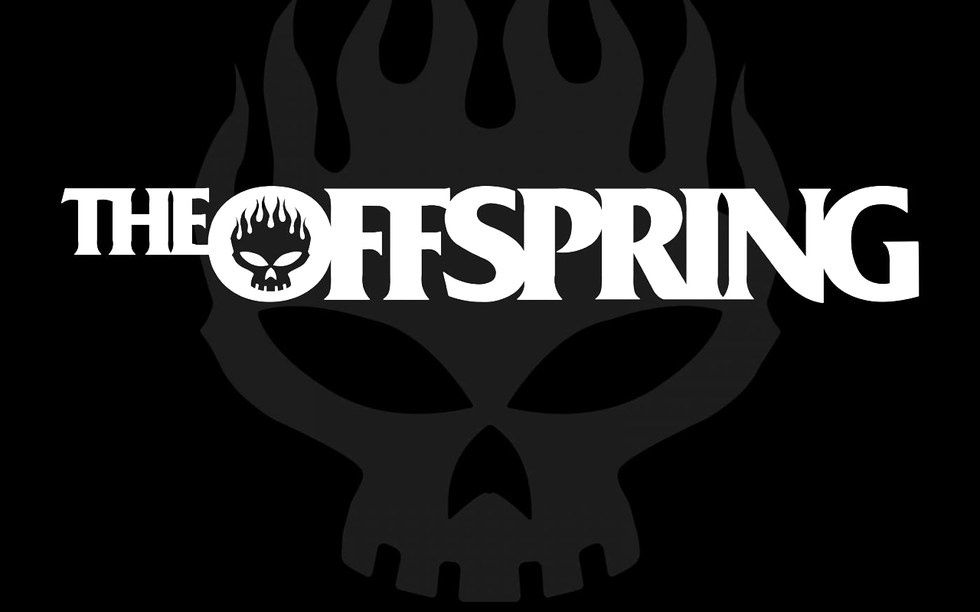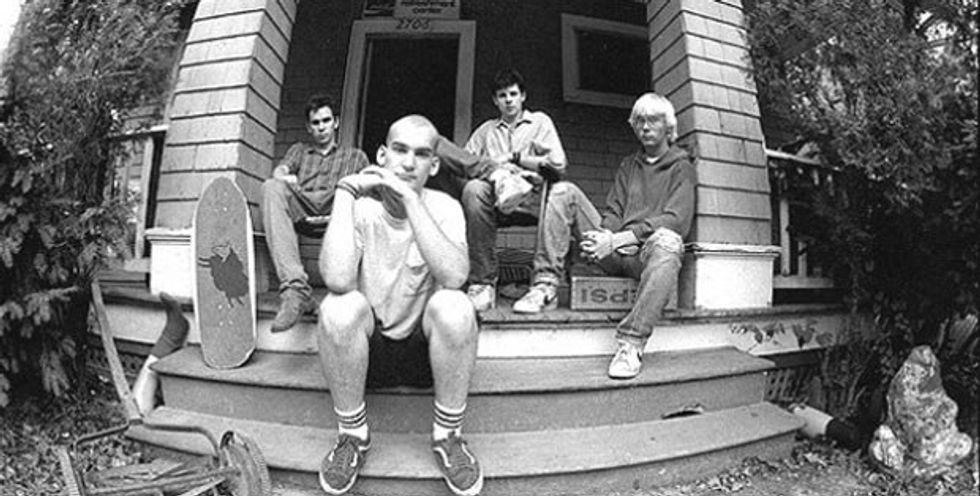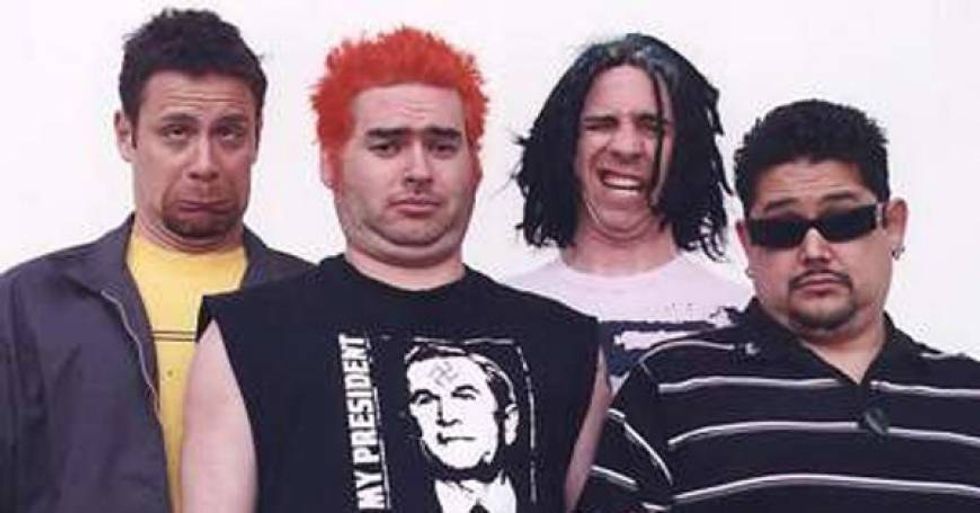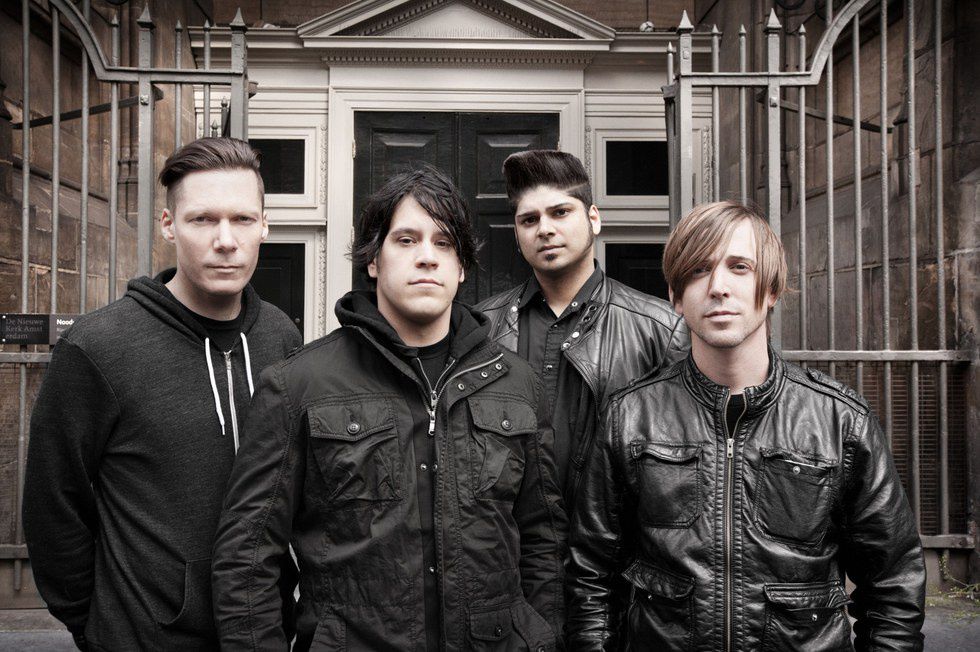Turn it up loud and get ready to be thrown into a world of consistent questions about socio political topics and personnel issues. These are the top ten most influential punk bands of our time. Before I get to the list, here are a few things to consider, 1. I look at a band's whole discography. 2. Influence and mainstream viability are both in consideration while I'm compiling this 3. Since I'm certain that most of the people reading this aren't really avid punk- rock fans and that I'm introducing you to a whole new (or mostly new) list of bands- it's worth noting that I'm probably not going to mention true pop punk bands. Because popular to contrary belief, I've come to know pop-punk bands as not only boy bands but bands that don't really fit the ethos of punk. And lastly, this is part 1 of a four (maybe five) part article.
1. Green Day
You probably thought that Green Day was an obvious choice, and you're right. Dookie was released in 1994 (that year will come up a lot in this article) but think about it, Green Day, along with some other bands on this list came at an important time in music history. Nirvana and grunge had really taken off and Vanilla Ice was still relevant (the latter reason is how you know the music industry was suffering. Green Day's Dookie was big on radio singles and, just like the next entry on the list, was very important in revitalizing mainstream interest and viability to punk rock.
2. The Offspring (Huntington Beach, CA)
Another prime choice, their first six albums are classics (and each of them deserve recognition on their own and will probably receive the honor of having their own designated article. Perhaps it's the fact that they're the band that made me pick up a guitar. Or, maybe it's because Smash (1994) is the highest selling independent punk-rock album of all time. And finally, maybe it's because Ignition (1992) and Americana (1998) are gems from beginning to end, but you can't help to love this band if you're a fan of the genre- even if they sold out on their last album.
3. Die Kreuzen (de-krot-zen) - Madison, Wisconsin
The first multi-faceted band on this list. They released a demo that circulated around the midwest entitled Cows and Beer (1981). Proceeding to release a self-titled debut in 1984 and October File (1986) before changing up their style to become more a progressive metal-band with grunge influences.
What made them unique is experimentation. But wait, there's more... they were actually great musicians and were compared to the likes of Metallica and rejected by labels because they sounded too diverse and raw. (too bad Seattle grunge hadn't come at that point or Die Kreuzen may still be around). According to an interview, the band and their fans recall them being rejected because they were "before their time" and thus, the music business and labels didn't know what to do with Die Kreuzen.
4. Husker Du (St. Paul, Minnesota)
They were the avant-garde punk band. Listen to The Zen Arcade record if you need a starting point or proof of my claim.
5. Black Flag (Long Beach, CA)
A certain band that we will talk about later have members that have been compared to Paul and John from the Beatles and it's easy to see why. But I'd like to introduce you to the Keith Richards and Mick Jagger of punk rock in Henry Rollins and Greg Ginn. Black Flag didn't invent punk, or even hardcore, but they were the first to perfect it. And all of this teen angst and societal disposition was set in direct opposition to the beach and warm comfortable weather associated with the paradise that was California. Their logo is synonymous and ever- ubiquitous in the genre, check out their debut Damaged (1981) and Slip it in (1986) to see my point. A band that comes up later in this article have been dubbed the "Rolling Stones" of punk- and I can agree with critics and fans in terms of mainstream appeal and legacy. However, sonically speaking; Black Flag should have that title.
6. Bad Religon (Los Angeles)
Disclaimer: If this logo offends, that's the point... but I wouldn't take it personally.
That's the irony of BR. They're not anti-religion. In fact, their singer and guitarist admit that they like having religious debates with friends. And while some may be turned off by the logo, it's worth noting that there lyrics aren't really one dimensional and often will present both sides of a philosophical, religious or socio-political topic within one song or expand the idea into the concept of an album- though they've never made a fully fledged concept album. Now, the other important thing about them to note that coincides with the lyrics is the vocabulary. When I studied for the ACT vocab all I did was listen to BR and I learned 300 words (also some songs on drums and guitar- but that is beside the point). Their fan-driven website has a lexicon with over 1000 words and links to the songs the word or phrase is found in. And beyond that, you can also read interpretations of the songs and add your own view in regards to the message behind the song. Greg Graffin, the band's singer, has a PH.D in evolutionary biology and has published a semi-autobiography, has his own solo material and teaches as a college professor at Cornell University.
Greg Graffin (singer) and Brett G.(guitarist) have been dubbed by critics as the " Lennon- McCartney of punk rock).
7. Minor Threat (Washington, DC)
When we talk about scene influence in the context of the 80's hardcore on the East Coast, we don't have to look too far to find gold. Minor Threat is a DC band that along with Scream and the Bad Brains put the East Coast on the map in terms of sales. Their influence was furthered by the Straight Edge Moment (SEM). All you have to do to understand the movement is listen to the MT song that coined it. The song is short like most hardcore songs (clocking in at 46 seconds in length) and gave a voice to a minority within the punk scene in allowed sober teenagers to be able to fit in. Of course, when the straight edge ethos moved up north and became more volatile (most notably in Boston), Minor Threat saw the harm in their seemingly harmless message and disbanded soon after violence broke out at one of their shows and lead singer Ian McKaye's brother got into a fight in the crowd and got his nose broken.
8. YDI
It's really hard to find a good picture of this band but they had an African-American singer like the aforementioned Bad Brains. But unlike BB, YDI was beloved from the beginning and was never banned like the Bad Brains were (don't worry though, the Brain's were only banned in DC- they even wrote a song about it called Banned in DC- check that out along with their whole self-titled debut... it's a classic. the reason you won't see them or The Ramones on this list is because it's too obvious, and unlike Green Day, Bad Brains never really changed their style or sold out.) To put it simply, putting these two bands on the list in any portion of this multi-part article would be as painfully obvious and arbitrary as trying to debate whether or not MJ was just as (if not more memorable and revered) than the Beatles.
9. NOFX (Los Angeles, CA)
Meet the "Rolling Stones" of hardcore. NOFX came to prominence with the release of Ribbed (1991) and Punk in Drublic (1994). Spanning a three decade career, the most unique aspect of this band is simple: They're nice, down-to-earth guys who love what they do. Their singer Fat Mike recently got sober- I'd call him the Eminem of hardcore (though I think Mike may be more intelligent despite his antics). Nonetheless, it's been 34 years and these guys aren't going anywhere, especially if Mike stays sober.
10. Billy Talent (Canada)
I'm just going to believe that most of you don't listen to punk for two reasons: Firstly, I can safely assume that you are avid social-media users and music streamers. And if you are, it's very unlikely that you've heard of most of these bands. If you have and my pretense is wrong- the latter reason is very much dealing punk ideology and how it coexists with emo/scene music. Some of what Billy Talent's albums, especially the early self-titled trilogy ( Billy Talent, Billy Talent II and Billy Talent III) all get meshed in with the emo/scene trends of the early 2000's it's important to look at this critically. Blink-182, Simple Plan and Taking Back Sunday were all considered emo. And though Billy Talent did come up in that scene as SP was simply the teen angst/romantic breakups cliche.






























